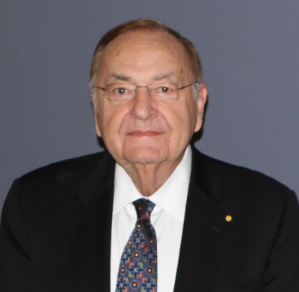Dr. Rod Howell is Professor of Pediatrics and Chair Emeritus of the Department of Pediatrics at the University of Miami School of Medicine. He is Board Certified both in Pediatrics as well as by the American Board of Medical Genetics in the area of Human Biochemical Genetics. He is the author of over 150 papers dealing with genetic-metabolic diseases in childhood. He also serves as the national Chairman of the Board of the Muscular Dystrophy Association (MDA).
Dr. Howell served as Senior Advisor to the Director of the Eunice Kennedy Shriver National Institute of Child Health and Human Development at the National Institutes of Health in Bethesda, MD (2004-2011). During this time, he oversaw some of the NICHD research initiatives in newborn screening, which is by far the most common use of genetic testing today.
“Dr. Howell really is a champion of newborn screening,” said Duane Alexander, M.D., who was director of the NICHD when Howell served as the senior advisor, a time when the institute’s research focused on newborn screening. “He has been the leader in that area of pediatrics ever since the 1960s. He is an outstanding pediatrician and advocate for children as well.”
As founding Chair of the Secretary’s Advisory Committee of Heritable Disorders in Newborns and Children (SACHDNC), Howell led the six-year effort to establish the U.S. Department of Health and Human Services’ national screening guidelines in 2010, including the addition of many genetic and metabolic conditions to the core newborn screening panel. As a result, nearly 95 percent of the 4.1 million children born in the U.S. each year are now screened for some 30 genetic disorders through a government-funded program.
“No matter if you’re rich or poor, if you can pay or not, if you have insurance or not, it gets paid for. Dr. Howell did that,” said Michele Lloyd-Puryear, M.D., Ph.D., who worked with Howell on the advisory committee. “I once asked him about screening for something, and doing it in a clinical setting, and he said that if you do that, then it won’t be universal and there will be kids left out of it, and that was always where he began. That was the principle he acted on — what was right for a child.”
Prior to his current position, Dr. Howell served as Pediatrician-in-Chief at Holtz Children’s Hospital at University of Miami/Jackson Memorial Medical Center, Pediatrician-in-Chief at the University Children’s Hospital at Hermann, and Professor and Chairman of the Department of Pediatrics at University of Texas Medical School at Houston. He is past-president of the American College of Medical Genetics (ACMG), served as Chairman of the Maternal and Child Health Research Committee of NIH, was a member of the National Medical Advisory Committee of the National Foundation/March of Dimes, and participated in numerous national panels and committees dealing with genetics and children’s issues. He has served as Chairman of the Ethical, Legal, and Social Issues Initial Review Committee of NIH’s NHGRI. Dr. Howell is a graduate of Davidson College and the Duke University School of Medicine, where he was trained in Pediatrics and Genetics.
In 1997 Dr. Howell chaired a consensus development conference that led to the first large carrier-screening program in the country to identify individuals at risk of having children with cystic fibrosis. He served as chairman of the Scientific Advisory Committee for the MDA, and in that role he directed the committee's activities to advance basic neuromuscular research. Such research supported by the MDA served as the basis for a major milestone—the Food and Drug Administration's approval of Myozyme®, the first effective treatment for Pompe disease. Dr. Howell has extensive expertise in Pompe disease, a rare genetic muscular disorder. His interest in genetics first came about while working as a research fellow at Duke under the direction of James B. Wyngaarden, MD. Though Wyngaarden's research focused primarily on metabolism in arthritis, Dr. Howell quickly learned that metabolism and genetics were closely connected. He says it has been most gratifying to witness the incredible advances made in metabolism and genetics over the years. “Conditions that were untreatable when I was a resident are now treatable,” he says. “I'd like to think I contributed in a little way to this.”
Sources:
“Dr. R. Rodney Howell’s Lifetime Achievements Honored by the American College of Medical Genetics”. University of Miami Miller School of Medicine, News 4.10.12.
“Renowned geneticist R. Rodney Howell receives ACMG Foundation Lifetime Achievement Award”. American College of Medical Genetics Press Release, 4.3.12.


